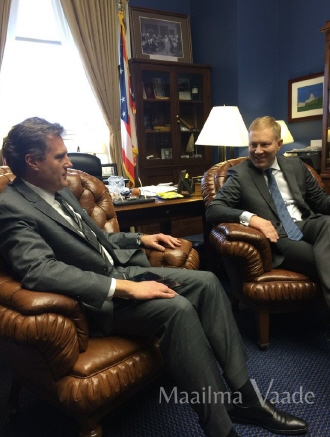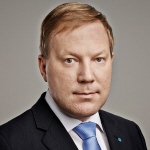Russia’s aggression toward Ukraine and overt information war against the West has led many to ask whether we are entering a new cold war. Whatever you call the present situation, the differences of opinion between Russia and the Western world seem so deep-rooted now that aggravation of the confrontation and possible long-term crisis in relationships seem inevitable.
The shadows of a cold war are making Estonia the border country of the free world. It is naturally in our interests that the current confrontation should not grow into a more serious conflict in which everyone would lose. It is also apparent that normalisation of the relations between Russia and the West would require a major change of attitude from Moscow in the first place. There seems to be no readiness for such a change today.
Russia, led by President Vladimir Putin, has been preparing for such a military and diplomatic offensive against the Western world for years. Signs that the former KGB officers who came to power in 1999 were not happy with the reality following the fall of the Berlin Wall were evident from the very beginning. Already in 1999 Putin’s confrères dreamed of extending the borders of Russia to the scale of 1913.
In 2005 Putin expressly stated that the collapse of the Soviet Union was the greatest geopolitical catastrophe of the 20th century. The Western world reacted with astonishment, but forgot quickly. A few years later Putin surprised the participants of the Munich security conference by his sharp speech that veered into revisionism. A few months later, Russia suspended the Treaty on Conventional Armed Forces in Europe and Estonia experienced cyber attacks.
The rise of the mellower Dmitri Medvedev as the President of Russia in spring 2008 once again distracted the West from the Russian strategy that was already being implemented. The August war in Georgia caused dismay, but when battles ended in less than a week, relations returned quickly to business as usual.
The French agreed with Russia to build Mistral amphibious assault vessels and the US tried to court Russia with a reset policy. A Europe grappling with economic difficulties saw Russia as a good growth market.
However, the background developments were already working against the strategic interests of the West. The war in Georgia had been the first serious setback to NATO’s possible enlargement to the Southern Caucasus. The Russian leaders did not hide their sense of triumph.
The European Union tried to make up for the situation by its Eastern Partnership policy, but this was a bureaucratic rather than a geopolitically realistic project from the start. The foreign and security policy mechanisms of the European Union did not favour the involvement of sharp strategic thinking in the shaping of common policies. At the same time, NATO was mainly focused on its Afghanistan mission, while the allies of Europe were trying to cut defence expenditure.
It was therefore no wonder that the events in Ukraine came as a startling wake-up call to many in the Western countries. The occupation and annexation of the Crimea was a shock, but it was still believed that President Putin would not go further in his ambitions. Only the shooting down of a Malaysian passenger plane in eastern Ukraine in July 2014 dissipated the doubts of even the most incredulous Western countries. It was understood that Russia’s actions were threatening the security of all Europe.
This is when the US and European Union member states managed to achieve a rare consensus in their Russian policies. It was understood that if no response was made to Russian aggression, the results could be even worse. The joint application of sanctions on various levels was a great diplomatic victory that the Kremlin obviously did not expect.
Russia made its own move, of course, but this did not destroy the European common front. Sanctions are in place at least until March and July next year and there is no reason to cancel these sanctions, at least at the time of this writing. Russia’s policy has not changed. It continues to put military, economic and political pressure on Ukraine. The Minsk agreements are not being fulfilled.
However, it would be a mistake to expect that the sanctions would have no effect. It is in fact even surprising how fast the effect has been. Analysts estimate that as a combined effect of low oil prices and sanctions, Russia is losing about 140 billion dollars a year. The rouble has lost nearly half of its value over a year. Furthermore, over 200 billion dollars of capital is expected to flow out of the country by the end of 2015. On top of it all, Russia’s economy is expected to go into recession next year, because even according to the most optimistic estimations, its GDP will fall by 0.8%.
Russia is hoping for relief from BRICS countries, especially China, but it might not be so easy to get from Beijing the billions that are necessary to revive the financial system. The fall in oil prices also seems persistent rather than temporary, which increases the stress on Russia’s budget.
All this makes Russia’s behaviour very difficult to predict. Considering how serious the strategic preparation period has been and that retreating would mean serious damage to Putin’s reputation at home, aggressive policy can be assumed to continue. Moscow thinks that the current time and the next few years are a good time to extend its field of influence.
Putin with his constantly changing tactics has been able to cover his tracks and Western countries have been tempted, once in a while, to meet Russia halfway. At the same time, it should be kept in mind that the success of diplomatic efforts depends on whether an agenda can be presented to Russia. There is little else to be done in a situation where Russia with its aggression and annexation of the Crimea has violated a number of fundamental principles of international law and crumbled the security of all Europe.
|
It should also be not forgotten that demonstrative flights by Russian military aircraft on the borders of NATO and partner countries have increased sharply over the past months. The Russian navy is also behaving more actively than usual, to say nothing of the use of the nuclear triad in various exercises. We should be especially concerned about the markedly increased use of nuclear threat by the political and military leadership of Russia.
All this forces the Western allies to be ready for a longer deterioration of relations. A new normality is coming into being, in which the border country Estonia and its allies have to get used to a much more complicated environment of relationships with Russia, in which no development can be precluded.
Estonia will have to focus its foreign political activities very seriously on ensuring its own security and that of Europe on a broader scale. The more similarly European countries perceive the impending threats, the more effective a common policy can be, whether pursued by the European Union or NATO.
While just a year ago it was almost impossible to explain why European countries in particular should stop cutting their defence expenditure, at least a clearer definition of threat exists today. NATO’s reaction to the occupation and annexation of the Crimea has also injected new energy into the activity of the alliance, at the core of which is the strengthening of collective defence in the face of new models of threat. The latter implies the alliance’s activities in case tactics such as hybrid warfare are used against one or many of its member countries.
Estonian diplomats and politicians must act consistently in the forthcoming months to implement the results of the NATO Wales Summit as quickly as possible. Constant cooperation with the US is also crucial. Hopefully the assignment of 25 million dollars from the US defence budget can be used already in 2015 to extend the facilities of the Ämari air force base. This would considerably improve the hosting of allied forces.
An important topic with the US and other allies is the guarantee of the constant presence of NATO units also after 2016. The arrival of rotating US units in spring 2014 was a very powerful signal to both the Estonian public and to Russia. President Obama has said that the forces would be rotated in Estonia as long as necessary. Estonia’s objective should be the achievement of permanent presence, because Russia can be hardly expected to back away from its anti-West expansionist policy in the foreseeable future.
Over the past months, the international media has frequently speculated on whether a city such as Narva could become a source of tensions. Some have even compared Narva to eastern Ukraine. Such sensationalist thinkers should be reminded on a constant basis that Narva is a border town of NATO. That says it all.
This does not mean that Estonia should not invest in a constant strengthening of internal security and the enactment of various threat scenarios, the latter both internally and together with the allies. The most important thing is to increase a credible determent ability to a level that makes any attempt to test the NATO collective defence extremely unlikely.
Estonia’s status as a border state means that strengthening international competitiveness is especially important. Despite the changed security environment, Estonia has to boost economic growth and extend the export and investment possibilities of our businesses.
Naturally, international investors have added a geopolitical component to their risk analysis of possible investments in Estonia. At the same time, Estonia’s security has never been more solid than it is today. The same applied in West Germany during the Cold War. The threatening proximity of Russian tanks did not hinder the rapid development of the economy.
Estonia’s foreign political focus must work to open new markets to Estonian businesses and find ways of improving their competitiveness by ways of smart export subsidies. The Asian direction is especially attractive as a stable growth and development environment in the foreseeable future.
Just as important as supporting Estonian businesses is the continued attraction of foreign investment to the country. Estonia must be able to maintain a stable and positive outlook in the ratings of international rating agencies. It is also important to strengthen the innovative image of Estonia, which is already working as a good magnet.
The forthcoming years may be decisive for Estonia’s future. We have to be ready for a worsening of the international security environment, but also for strengthening Estonia’s success story. The new normality must give us a new development boost.
|







